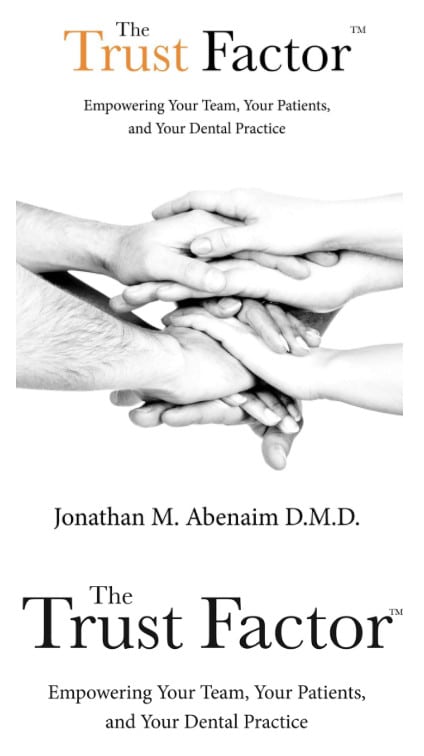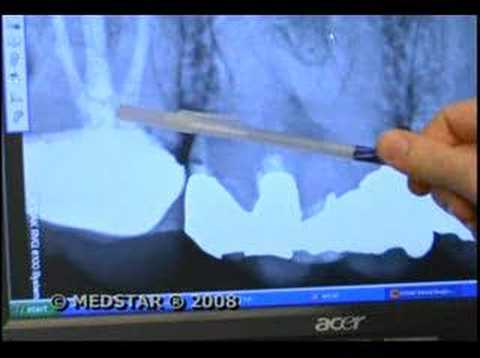Dentist practices are facing a crisis of patient trust. They suffer from the same affliction plaguing physicians’ practices at large. Namely, private practices are being gobbled up at an alarming rate by hospitals and venture capitalists. To survive, a practice must build solid trust relationships with patients. Sadly, that trick is getting exponentially harder to pull off.
Consider that patients today come into the examination room pre-armed with Google searches and self-diagnoses that can prove unshakeable. One bad review in social media or review sites can stick like glue and undermine a patient’s trust in a dentist or doctor before she even pulls into the parking lot. In this dog-eat-dog environment, what can a beleaguered dentist do?
Creating Dentist Patient Trust
To learn how dentists can create better trust relationships with patients, we interviewed the man who literally wrote the book on dentist patient trust: Dr. Jonathan Abenaim, D.M.D. and owner of Jonathan Dental Spa, referred to as the best dentist’s office in New Jersey by its cadre of loyal patients.
Dr. Abenaim is the author of the book, The Trust Factor: Empowering Your Team, Your Patients, and Your Dental Practice. He originally penned it as a training aid for new hires at his practice.
“Training new employees used to be an endless task,” says Abenaim. “So we decided to write a book about our beliefs and the fundamentals of creating dentist patient trust. Now, it has become a resource of choice for other dentists and their teams.”
Trust is “We”

When Dr. Abenaim says “we” wrote a book, he means it literally. The Trust Factor was co-authored by his team members, who all have a stake in the success of the practice.
“It’s not just written by me,” says Abenaim. “It’s written by every team member.”
In fact, credits listed on the book include Stephanie Curcio, Treatment Coordinator, Kailey Allen, dental hygienist, and Sonja Milevski, lead dental assistant.
Why Patients Don’t Trust Dentists
To get at why patients seldom trust their dentists, Dr. Abenaim points out the problem with doctor’s offices in general.
“When you come into the typical doctor’s office,” he says, “it has the huge window in the front. They slam it open and then slam it closed. They make you sit like cattle in the waiting room. Then they take you to an exam room where you wait for another 45 minutes before a rushed visit with the doctor. How do you think that brings trust to the practice? Would you trust that doctor? You’re angry by the time he finally sees you.”
12 Tested Ways to Build Patient Trust
The 12 methods below for building dentist patient trust come from Dr. Abenaim’s new book. The methods arose specifically from Abenaim’s experience as a dentist, but they’ll work for any kind of physician’s practice.
The list includes some rarely followed common sense items like tossing the ego out the window, as well as lesser-explored tips like how to apply the Pareto principle to your client list. All in all, any dentist (or doctor) will find some excellent, actionable advice in the suggestions below.
You might also want to check out our general post on how to build patient trust across all disciplines.
1. Know You Can’t Do it All

The first step to getting patients to trust you is to take a page from the Alcoholics Anonymous playbook and let go of control.
“In a typical dentist’s office or doctor’s office,” says Abenaim, “the doctor has the ego to believe he can do everything by himself, and he doesn’t need anybody around him.”
In Abenaim’s view, that kind of thinking is a recipe for the destruction of patient-dentist trust. A doctor or dentist has to understand she can’t do anything at all without her team. Once that’s understood, the way she engages her patients is as important as deciding to do it in the first place.
2. Give Trust to Get Trust
The next step in getting patients to trust you is first giving trust… to your team members. Placing trust that way may seem esoteric, but in fact it sets the tone for the entire business, and it’s something patients feel from the moment they walk through the door.
“We believe patients are body language experts,” says Abenaim, “and you just can’t fake passion, love, and fun. When patients see this great trust between the doctors and the team members, it’s so much easier for them to respond with trust.”
How can dentists know if they’re doing this the right way? Ask. Take the heartfelt words below from Stephanie Curcio, Team Coordinator at Jonathan Dental Spa.
“Dr. Jonathan trusts us to be on the same level as he is,” says Curcio. “As a result, I’m able to feel confident in what I do, and know that I can make mistakes and learn from them. He empowers me so I can empower the rest of my team, and the team as a whole empowers the patient, and they see that and they feel that. From the second they walk through the door it’s about the patient experience.”
3. Create a Vision
Beyond trusting team members, one of the biggest things a dentist can do to build trust with patients is to create a vision for the practice. That vision ought to paint a picture of the practice as a place patients can feel comfortable.
“Is your practice vision to take all insurances and see 500 patients a day?” says Abenaim. “I don’t think anybody became a doctor to see 500 patients a day. That’s not passion. That’s probably slave labor. And I can never tell somebody that they’re going to have a great time doing that. They have to have a vision of what they’re going to enjoy doing every day. Because if they come to work hating what they do, then their team will hate it too, and their patients will hate being there.”
4. Pay Attention to the Little Things
Lack of dentist patient trust can be as simple as the tiny things we do the same way a hundred times a day.
“The practices that’ll always thrive are the ones that differentiate themselves from everybody else. The way you answer the phone. Do you say, “Dental clinic, please hold,” and then put the patient on hold for five minutes? That patient’s not going to be spending $10,000 in your practice. They’re just not. And guess what, if you’re an out of network provider, they’re not going to pay their deductible either, because you just made them wait on hold for a long time.”
5. Use Google as an Opportunity, Not a Threat

One of the biggest complaints from dentists is that patients come in armed with Google search. That is, they walk into a dentist’s office or a doctor’s office self-diagnosed, thanks to WebMD or Mayo Clinic articles, or less reputable sites. When the dentist comes back with training and real knowledge, the patients often don’t want to hear it.
How can we build trust when faced with an obstacle like that? According to Dr. Abenaim, Google isn’t a threat. It’s an opportunity. Rather than trying to sell procedures and services to unwilling patients, a dentist can listen to patient concerns, develop a thorough understanding of where the patient is coming from, then use that Google knowledge as a jumping off point to educate the patient further.
6. Don’t Sell. Educate.
Dentists, naturopaths, dermatologists, plastic surgeons, and concierge physicians all make the mistake of selling to their patients. As Dr. Abenaim puts it, selling erodes the precious patient-dentist trust at precisely the wrong moment.
“One of the things we talk about in our book,” he says, “is that you should never be selling anything in your practice. Because think of it this way. When was the last time you trusted somebody called a salesman? Never. So what we do in our practice is, we share as much information as we can. And the patient asks for it. We never have to sell it. We just share it. And the patient will say, “Okay, well I need that, how do I get that done?
Treat the Patient with Respect
Most often, patients come into a dentist’s office to get their teeth cleaned. They don’t want to think about any additional expense in terms of money, time, or stress. It’s very difficult for a dentist or a doctor to overcome that mindset.
The way through is again to educate. And when we do that, the way we go about it is critical.
“The way that you talk to them is key,” says Abenaim. “The way you look at them, the way you sit next to them, the way you speak to them by name. Do you look in their eyes or do you look away when you talk? What tone do you use? Do you let them actually say what their issue is?”
7. Work to Boost Awareness

Sometimes building dentist patient trust is all about how a dentist builds awareness with a patient. As Dr. Abenaim points out, that can mean framing the problem in different terms.
“We’ll say, let’s talk about it,” he says. “Here’s a picture of your teeth, what do you see? Have you ever had this problem? Yeah, actually I’ve had bad breath. Have you ever brushed and had your gums bleed? Well, yes. So then we talk about, okay, well if you woke up in the morning and scratched your head and it started to bleed, would you be concerned? They say yeah, absolutely. So we increase awareness for patients.”
Trust in Medical Waste Disposal
While you’re reading about building trust in your practice, think about the vendors you trust too. Do they raise the rates on you every few months? Most medical waste disposal companies do. Not MedPro Disposal.
MedPro Disposal offers low-cost, secure medical waste disposal with predictable service and predictable cost. Check out our practice savings calculator here to see how much you could save on your medical waste disposal.
Find Out How Much You Can Save Instantly.
Try our on-line savings calculator.
8. Be there for Patients in a Time of Need to Fight Negative Reviews
There are two main reasons dentists get bad online reviews, according to Dr. Abenaim. The first is that a doctor didn’t take the patient’s insurance. There’s not much we can do about that one, since it’s just part of our current system. But the second happens when a doctor doesn’t support a patient in a time of need.
“When the patient needed the doctor the most,” says Abenaim, “the doctor wasn’t there for them. And the team wasn’t there for them. When they had an emergency, the doctor said, or the team said, well you’re going to have to wait four months, or go to the hospital.”
Going the extra mile means sacrificing a little time and money up front to save ten times that much in negative publicity down the road.
9. Work with the Patient’s Income Level
One gigantic way for dentists to build trust with patients is to understand not only their medical concerns but also their financial situations.
A dentist can build a lifelong bond with a patient by simply taking the time to know where he or she is coming from economically.
“So one of the things we do in our practice,” says Abenaim, “is that we really try to work with everybody’s finances so we can help change lives. It’s not about how much money we’re going to make. We focus on how many lives we can change.”
10. Invest Emotionally in the Patient’s Journey

Patients trust dentists who genuinely care about their well-being. That’s not just something a doctor accomplishes with his bedside manner. It has to be ingrained in the entire team and practice. One of the ways Dr. Abenaim’s team does this is with a “healthy mouth bell.”
“When a patient is healthy,” he says, “meaning they came in and they were totally unhealthy and we did a treatment plan with them and we got them healthy and we were able to change their lives, get them to stop medication, have them start a new job because of how confident they felt, we have something called the healthy mouth bell. And before they leave on their last appointment, they ring the bell and everybody celebrates with them because we’re so happy that we had the ability to be engaged to change their lives.”
This kind of add-on solidifies the bond between the dentist, team, and patient.
11. Create a Safe Place for Patients
One of the things a practice absolutely has to do to foster dentist patient trust is to create a culture of safety.
“A doctor’s office is not safe,” says Abenaim. “Patients get judged, whether they’re too fat, whether their teeth aren’t clean, they don’t want to be judged. They want to feel safe. And you have to find a way to make it safe in your practice. If the girl or guy in the front is rude, doesn’t call you back, tells you that when you’re about to die, you have to wait six months for an appointment, you’re not building the trust of your practice because you’re telling people that you just don’t care.”
That comes down to aligning team members with the vision for the practice, and that again comes down to trusting them.
12. Don’t Treat Every Patient
Another way to build trust with dental patients paradoxically involves breaking it with some. The way Dr. Abenaim sees it, dentists waste time trying to please a small number of patients who are unpleasable, thereby alienating the majority of patients who are actually very easy going.
“People think they need 100 patients to make X amount of dollars,” says Abenaim. “Well, if you get rid of those 20 patients that end up costing you all this money, you’re working less and making more. It’s not about the volume. It’s about the quality. So when a patient always calls and breaks their appointments, always says they don’t want to pay their deductibles, and never pays their out of pocket, and when a patient never listens to your recommendations for treatment, you don’t want that patient in your practice because they’re costing you money. They’re not allowing you to do what you love to do, so what’s the point?”
This application of the 80/20 rule or Pareto principle to a dentist’s client list can create 80% more time for a practice, which means the business actually earns more money.
Conclusion
Dentist patient trust has entered a crisis period in the United States. As hospitals and venture capitalists gobble up more private physicians’ practices and private dentists’ offices, only those most trusted will survive. The trouble is, patients are more skeptical than ever, thanks to Google, Facebook, and review sites like Yelp or Healthgrades.
In that environment, trust starts at the top of the house, with a vision for the practice. Next, the dentist sets the tone by extending trust to her employees. Once every team member treats each patient with respect and courtesy, trust will start to flow the other way as well.
Dr. Abenaim promotes two resources to help other dentists build trust with their own patients: The Trust Factor book and The Smile Syllabus Training Institute, his course education program to create patient trust and predictable, high-quality results.
Trust Your Medical Waste Disposal Partner
Wishing you could trust your medical waste disposal firm? Find out why more clinics and private practices trust MedPro Disposal. MedPro delivers reliable service at predictable prices. In a world where rate hikes are the norm, that’s a refreshing difference.
To see how much you could be saving, check out their handy savings calculator here.


